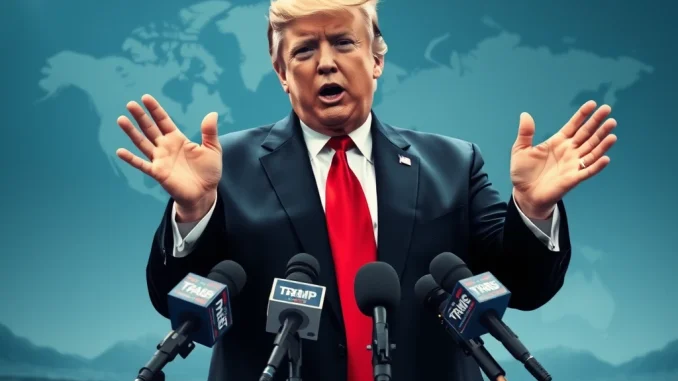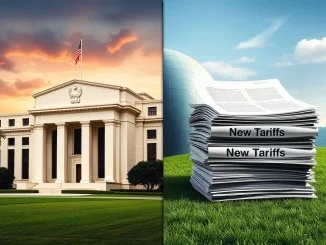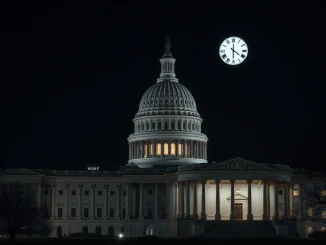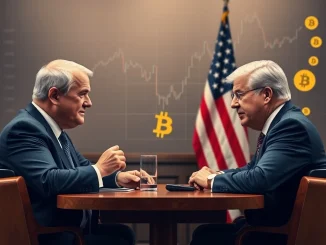
In a move that has sent ripples across global markets, former U.S. President Donald Trump has once again stepped into the limelight, this time hinting at a swift resolution to international trade tensions. Speaking to reporters, Trump declared his intention to forge trade deals with nations worldwide, including China, within a remarkably short timeframe of just three to four weeks. This announcement, as reported by CNN, has ignited a flurry of speculation and anticipation about the future of global commerce and its potential impact on various sectors, including the ever-evolving world of cryptocurrency.
What’s the Buzz Around Trump’s Trade Deal Promise?
Trump’s assertive statement, “We’re going to make a deal with everybody,” underscores a significant shift in his administration’s approach to international trade. Previously known for his confrontational stance and imposition of tariffs, this new declaration suggests a pivot towards negotiation and agreement. The ambitious timeline of trade deals within a month raises eyebrows, prompting questions about the scope and depth of these potential agreements. Will these be comprehensive pacts, or more limited, interim arrangements? The answer to this question holds considerable weight for the future of the global economy.
Here’s a breakdown of what we know:
- Ambitious Timeline: Trump aims to finalize multiple trade deals within 3-4 weeks, a remarkably short period for such complex negotiations.
- Global Scope: The intention is to negotiate with “everybody,” suggesting a broad approach encompassing numerous countries and regions.
- China Included: Crucially, China is specifically mentioned, indicating a potential thaw in the trade tensions that have characterized recent years.
- Market Reaction: News of potential trade deals often triggers market volatility, as investors attempt to predict the winners and losers in a reshaped global trade landscape.
Why Does a Trade Deal Matter for the Global Economy?
Trade deals are the bedrock of international commerce. They dictate the rules of engagement for buying and selling goods and services across borders. When countries engage in trade, it can lead to numerous benefits, including:
| Benefit | Description |
|---|---|
| Economic Growth | Reduced trade barriers can boost exports and imports, leading to increased economic activity and GDP growth. |
| Job Creation | Expanding trade opportunities can create new jobs in export-oriented industries and related sectors. |
| Lower Prices for Consumers | Trade deals can lead to reduced tariffs and import costs, translating to lower prices for consumers on a wide range of goods. |
| Increased Competition and Innovation | Exposure to international competition can spur domestic industries to become more efficient and innovative. |
| Improved International Relations | Trade deals can foster stronger diplomatic ties and cooperation between nations. |
However, trade deals are not without their complexities and potential downsides. Concerns often arise regarding:
- Job Displacement: Certain domestic industries may face increased competition and potential job losses due to imports.
- Environmental and Labor Standards: Critics argue that some trade deals may prioritize economic gains over environmental protection and labor rights.
- National Sovereignty: Concerns can be raised about the potential impact of trade deals on national laws and regulations.
Decoding Trump’s Economic Policy and its Potential Impact
Trump’s economic policy has been characterized by a blend of protectionist measures and deregulation. His previous imposition of tariffs on goods from China and other countries led to trade disputes and retaliatory measures. This new announcement of pursuing trade deals suggests a possible evolution in his approach. Understanding the nuances of his economic policy is crucial for gauging the potential outcomes of these proposed agreements.
Key questions to consider include:
- What will be the focus of these deals? Will they primarily target tariff reduction, or will they encompass broader issues like intellectual property, services, and investment?
- Will these deals be reciprocal? Will the U.S. demand equal concessions from its trading partners, or will it adopt a more unilateral approach?
- How will these deals be received by other countries? Will nations be receptive to Trump’s proposals, or will they view them with skepticism given past trade tensions?
Navigating the Global Market Outlook Amid Trade Deal Speculation
The global market outlook is currently a complex tapestry of economic indicators, geopolitical uncertainties, and evolving trade dynamics. Trump’s trade deal announcement adds another layer of complexity to this landscape. Investors and businesses are closely watching for signals that could indicate the direction of global trade and its potential impact on various asset classes, including cryptocurrencies.
Here are some factors to consider when assessing the market outlook:
- Investor Sentiment: Positive news about trade deals could boost investor confidence and risk appetite, potentially benefiting risk-on assets like cryptocurrencies.
- Currency Fluctuations: Trade deals can influence currency exchange rates, which can have ripple effects across global markets.
- Supply Chain Adjustments: Significant trade deals could lead to shifts in global supply chains as businesses adapt to new trade rules and opportunities.
- Inflationary Pressures: The impact of trade deals on inflation is a subject of ongoing debate. Some argue that they can be deflationary by reducing import costs, while others contend they can be inflationary under certain circumstances.
The Ripple Effect: How Trade Deals Could Touch the Crypto World
While seemingly distant, trade deals and the broader global economy have indirect but important connections to the cryptocurrency market. Here’s how:
- Market Sentiment and Risk Appetite: A positive global market outlook, potentially fueled by successful trade deals, can create a more favorable environment for risk assets like cryptocurrencies. Conversely, trade tensions and economic uncertainty can dampen investor enthusiasm.
- Macroeconomic Factors: Cryptocurrencies, while often touted as being independent of traditional financial systems, are still influenced by macroeconomic trends. Economic policy shifts and changes in the global economy can indirectly affect crypto market dynamics.
- Global Adoption: Trade deals that promote international cooperation and economic growth could foster a more conducive environment for the global adoption of cryptocurrencies.
- Regulatory Landscape: While not directly linked to trade deals, the overall geopolitical climate and international relations can influence the regulatory landscape for cryptocurrencies.
Final Thoughts: Navigating the Trade Winds
Trump’s announcement of aiming for trade deals within weeks has injected a dose of both excitement and uncertainty into the global economy. The specifics of these potential agreements, their scope, and their ultimate impact remain to be seen. For those involved in the cryptocurrency space, monitoring these developments is crucial. Understanding the broader market outlook and the potential shifts in economic policy can provide valuable insights into the evolving landscape and help navigate the ever-dynamic world of digital assets. Stay informed, stay vigilant, and prepare to adapt as the trade winds shift.



